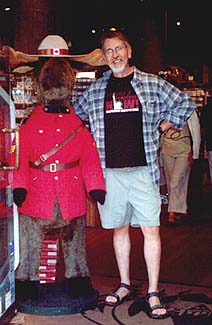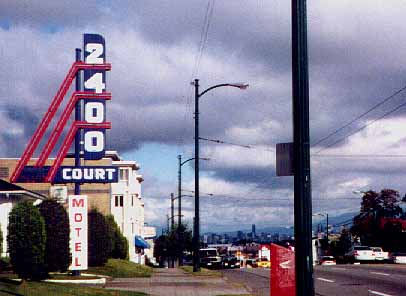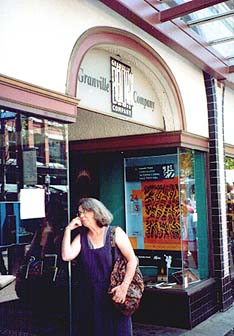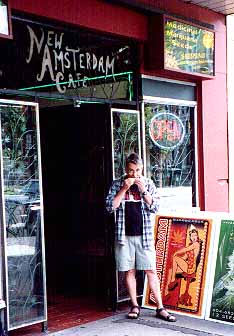Vancouver, British Columbia
For our summer of 2005 vacation, Alison and John decided to go to the Vancouver Folk Music Festival -- THE big festival on the west coast of North America. We had a good time there when we went in 1991, and thought it would be nice to go back. Then, we did it as part of a 2-week road trip. This time, we flew there on a one-week trip, and actually had more time to explore Vancouver ... which we did with a vengeance. Besides downtown, we walked sympatico neighborhoods all over: Commercial Drive, South Main, Chinatown / Gastown, West Broadway and South Granville. We even drove around suburban North and West Vancouver. Few photos of these ventures; Alison said she didn't want to look like a tourist. This turned out to be a non-issue: with our Bay Area style, we fit right in ... as long as folks didn't catch the funny way we say "about", or notice the time it took us to convert from the metric system.

Water Street in downtown Vancouver is Tourist Shop Central, but also is home to some serious galleries of First Nations art (that's Canadian for 'Native American'). The shop pictured is not one of the latter. Here you can buy postcards, T-shirts, little totem poles made in China, and very, very small bottles of maple syrup. In this photo, it looks like Bullwinkle has been rehearsing for the role of Dudley Dooright.
Below is where we stayed: the 2400 Motel on Kingsway. This is a 1930's style motor court with small cabins ... ours had a kitchenette. It was cute, clean, and cheap, but fairly far away from everything. The view is to the northwest, with downtown Vancouver in the distance, and the mountains of West Vancouver beyond.

Kingsway is a main drag in Vancouver; it combines highways 99A and 1A ... which is a good lead-in to talking about driving in Vancouver. Gas is about $1 CN per liter, which works out to around $3.20 US per gallon. There are no freeways within city limits; the highways have stoplights and a 50 kph limit (around 30 mph) ... so driving anywhere takes a long time. (Did we mention that Canada, along with the rest of the planet, is metric?) The curbside parking spaces theoretically become traffic lanes during rush hour, but prudent drivers avoid the right lane. Upon arriving, John was confronted with The Blinking Green Light, and had no idea what to do (it turns out that they mark intersections where pedestrians may push a button and give drivers the red light). Parking is either very expensive or impossible; most streets have preferential parking for residents, and non-residents get not 2 hours, but no time at all. Public transit, however, is pretty good, and most citizens use it. One gets the feeling that automobiles are being discouraged by high cost, along with tobacco and alcohol.
We, like most Americans, assumed the routine of reserving a rental car at the airport. In retrospect, we probably should have reserved a hotel downtown, and relied on public transit for our in-town excursions.
Below left: Alison is teary-eyed over the closure of the Granville Book Company. This shop had been the Granville Book Coop when we visited in 1991. Then, the street was like a San Francisco Tenderloin Lite ... cheap hookers, drug dealing, porn shops, and SRO hotels, but no drive-bys. One felt safe walking around, even late at night. Now it is quite upscale, and an indie bookstore can't cut the high rents and taxes. Vancouver now is experiencing a real estate bubble that dwarfs ours ... there is this myth about the 2008 winter olympics, and folks seem to have forgotten Toronto's experience. The average young Jane and Joe are working 2 and 3 jobs to afford those quarter-million-and-up condos.


Above right: John rolls a cigarette (tobacco) in front of the New Amsterdam Cafe. Marijuana had a quasi-legal status in BC, and this cafe used to sell local produce to enjoy with your latté. But recently the local gendarmerie has cracked down ... residents blame this on the current US administration's diplomatic efforts. See this rant about the US DEA pulling strings across the border.